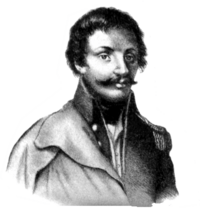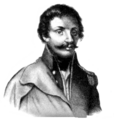Władysław Franciszek Jabłonowski facts for kids
Quick facts for kids
Władysław Franciszek Jabłonowski
|
|
|---|---|
 |
|
| Nickname(s) | Murzynek |
| Born | 25 October 1769 Gdańsk, Poland |
| Died | 29 September 1802 (aged 32) Jérémie, Haiti |
| Allegiance | |
| Years of service | 1786–1802 |
| Rank | Brigadier general |
| Battles/wars | Szczekociny, Warsaw, Maciejowice and Praga, Kościuszko Uprising, Haitian Revolution |
Władysław Franciszek Jabłonowski (born October 25, 1769 – died September 29, 1802) was a brave Polish general. He was a military leader who fought for France during the Napoleonic Wars. These were big wars in Europe led by Napoleon Bonaparte.
Władysław is special because he was the first known Polish general of African descent. He sadly died from a serious illness called yellow fever in 1802. This happened in a place called Saint-Domingue (now Haiti).
At that time, Polish soldiers were helping the French army there. They were fighting against formerly enslaved people who wanted their freedom. Many French and Polish soldiers got sick and died from yellow fever. Because of this, Napoleon had to pull his remaining soldiers out. Some Polish soldiers even decided to join the enslaved people in their fight for freedom. About 400 to 500 of them stayed on the island after the war. They were given full citizenship by Jean-Jacques Dessalines, who became the leader of the new country, Haiti.
Early Life and School Days
Władysław Jabłonowski had a mixed background. His mother was Maria Dealire, an English noblewoman. His father was a man of African descent. Władysław was given the nickname "Murzynek."
Maria Dealire's husband, Konstanty Jabłonowski, was a Polish nobleman. He accepted Władysław as his own son and gave him his family name. This meant Władysław was considered Polish.
In 1783, when Władysław was a teenager, he went to a French military school. This school was called the École Militaire in Paris. He was classmates with famous people like Napoleon Bonaparte. At school, Władysław faced unfair treatment and racist comments from some students, including Napoleon. After graduating, he joined a German regiment in the French army. There, he became a lieutenant.
Military Adventures
In 1794, Władysław Jabłonowski fought in the Kościuszko Uprising. This was a fight led by Tadeusz Kościuszko against Tsarist Russia. Władysław took part in several important battles. These included the battles of Szczekociny, Warsaw, Maciejowice, and Praga.
In 1799, he was promoted to General of Brigade. This was a high rank in the Polish Legions. These legions were Polish military units serving with the French army.
From 1801, he led a group called Legia Naddunajska. Władysław asked to be sent to the colonies. He wanted to serve in places like Louisiana or Saint-Domingue. In May 1802, he went to Saint-Domingue to help the French forces. His common-law wife, Anne Penot, went with him.
There, he was involved in trying to stop the Haitian Revolution. This was a fight for freedom by formerly enslaved Africans. Władysław Jabłonowski died from yellow fever on September 29, 1802. He passed away in Jérémie, Haiti. This was just three weeks after more Polish soldiers arrived.
Yellow fever caused many deaths among both French and Polish soldiers. More soldiers died from the disease than from fighting. Eventually, about 400 of the Polish soldiers who survived left the French side. They joined the enslaved people in their fight for freedom. These soldiers settled in what became Haiti. Their descendants are known as Polish Haitians.
Władysław in Polish Stories
Władysław Jabłonowski is even mentioned in a famous Polish poem. It's called Pan Tadeusz by Adam Mickiewicz. In the poem, a veteran of the Polish legions talks about what he saw:
- how Jabłonowski had reached the land where the pepper grows
- and where sugar is produced, and where in eternal spring
- bloom fragrant woods: with the legion of the Danube there
- the Polish general smites the Negroes, but sighs for his native soil
This shows that even back then, people knew about his travels and his role in distant lands.
Images for kids
 | Bessie Coleman |
 | Spann Watson |
 | Jill E. Brown |
 | Sherman W. White |


